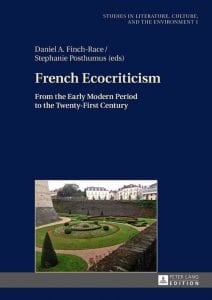French Ecocriticism: From the Early Modern Period to the Twenty-First Century
 Stephanie Posthumus and Daniel Finch-Race, editors. Frankfurt, Peter Lang, Studies in Literature, Culture, and the Environment, 2017.
Stephanie Posthumus and Daniel Finch-Race, editors. Frankfurt, Peter Lang, Studies in Literature, Culture, and the Environment, 2017.
French Ecocriticism expounds fruitful ways of analysing matters of ecology, environments, nature, and the non-human world in a broad spectrum of material in French. Scholars from Canada, France, Great Britain, Spain, and the United States examine the work of writers and thinkers including Michel de Montaigne, Victor Hugo, Émile Zola, Arthur Rimbaud, Marguerite Yourcenar, Gilbert Simondon, Michel Serres, Michel Houellebecq, and Éric Chevillard. The diverse approaches in the volume signal a common desire to bring together form and content, politics and aesthetics, theory and practice, under the aegis of the environmental humanities.
Table of Contents:
– Introduction: Developing French Ecocriticism [Daniel A. Finch-Race/Stephanie Posthumus]
(Part I) Early Modern Economies and Ecologies
– Through a Glass Darkly: Dominion and the French Wars of Religion [Jeff Persels]
– The Vanity of Ecology: Expenditure in Montaigne’s Vision of the New World [Pauline Goul]
(Part II) Romanticism and Nature; Naturalism and Animality
– Victor Hugo and the Politics of Ecopoetics [Karen F. Quandt]
– Fauves in the Faubourg: Animal Aesthetics in Émile Zola’s Thérèse Raquin [Claire Nettleton]
(Part III) Nineteenth-Century Ecopoetics
– Ecopoetic Adventures in Rimbaud’s ‘Sensation’ and ‘Ma Bohème’ [Daniel A. Finch-Race]
– Towards an Ecopoetics of French Free Verse: Marie Krysinska’s Rythmes pittoresques[David E. Evans]
(Part IV) Twentieth-Century Ecological Thought
– Marguerite Yourcenar’s Ecological Thinking: Wilderness, Place-Connectedness, Biocentrism, and an Ethic of Care [Teófilo Sanz]
– Michel Serres: From Restricted to General Ecology [Christopher Watkin]
(Part V) Millennial Bodies, Origins and Becoming-Milieu
– Ecoerotica in Stephane Audeguy’s La Theorie des nuages [Jonathan Krell]
– The Individual as Environment: Watching Jean-Claude Rousseau’s La Vallée close with Lucretius and Simondon [Nikolaj Lübecker]
(Part VI) Twenty-First-Century Natural Limits
– Writing (on) Environmental Catastrophes: The End of the World in Eric Chevillard’s Sans l’orang-outan and Michel Houellebecq’s La Possibilité d’une île [Anais Boulard]
– On the Meaning of Being Alone with Nature: Sylvain Tesson’s Ecocritical Sincerity and Ecopoetic Sensuality in Dans les forêts de Siberie [Hannes De Vriese]
(Part VII) Horizons and Prospects
– Engaging with Cultural Differences: The Strange Case of French écocritique [Stephanie Posthumus]
